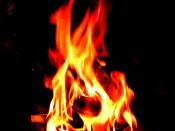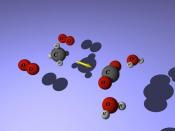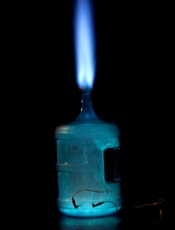Plan:
Aim:
The enthalpy change of combustion of a fuel is a measure of the energy transferred when one mole of fuel burns completely. A value for the enthalpy change can be obtained by using the burning fuel to heat water and using fact that 4.2j of energy are required to raise the temperature of 1g of water by 1oC. In this investigation my aim is to find the enthalpy change of combustion of a number of alcohols so that I can investigate how and why the enthalpy change is affected by the molecular structure of the alcohol.
I am going to investigate the enthalpy change of combustion for the alcohol homologous series. I will investigate how alcohols with increasing number of carbons affect the enthalpy change when an alcohol goes under combustion. The energy that alcohols release when being used is called the enthalpy change of combustion.
As I already know that alcohols are a series of organic compounds which all contain a -OH group.
My Prediction:
By using the knowledge that I already have I think that the alcohols with a larger number of carbon atoms within the molecule will have a greater alcohol change of combustion than the alcohols with less carbon atoms. So therefore I predict that as the molecular mass increases so does the enthalpy of combustion.
The alcohols that I intend to use throughout this investigation are the following 6 alcohols:
ÃÂ Methanol - CH3OH solvent; fuel; manufacture of organic chemicals; denaturing ethanol straight chain alcohol.
ÃÂ Ethanol - (CH3CH2OH) ethyl alcohol; grain alcohol. A colorless, flammable liquid produced by fermentation of sugars. Straight chains.
ÃÂ Butane - CH3CH2CH2CH3, colourless, with a characteristic natural odor
ÃÂ Pentan-1-ol -straight chains alcohol.
ÃÂ Hexan-1-ol - straight chain alcohol.
ÃÂ Propan-1-ol - straight chain alcohol.
Using the...


